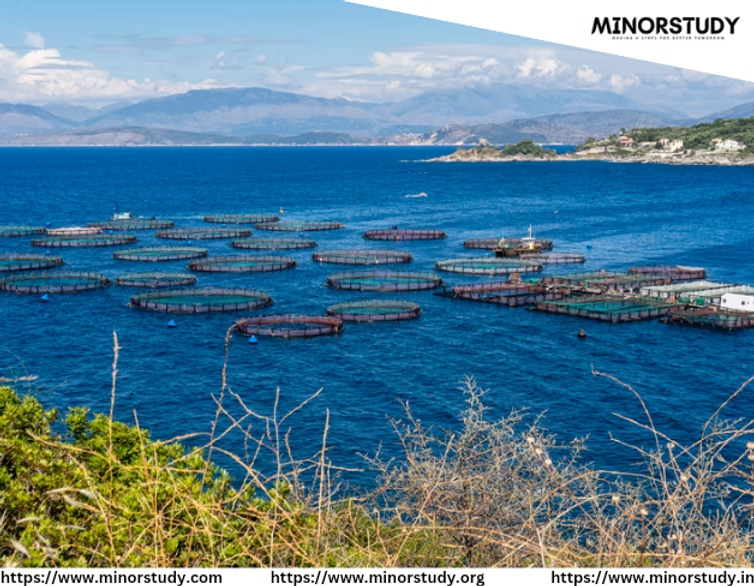Bachelor of Science in Agriculture (BSc Agr) – Aquaculture Major
The Bachelor of Science in Agriculture (BSc Agr) with a Major in Aquaculture is a specialized undergraduate program focused on the science and management of aquatic organisms in controlled environments. Aquaculture plays a vital role in the global food supply, and this program prepares students to work in the sustainable production of fish, shellfish, and other aquatic species. The curriculum blends biological sciences with practical aquaculture management techniques to address both environmental and economic challenges in the industry.
Program Overview
Degree Name: Bachelor of Science in Agriculture (BSc Agr) – Aquaculture Major
Type: Bachelor’s Degree
Duration: Typically 3-4 years
Focus: Sustainable aquaculture practices, aquatic biology, and production management for the farming of fish and other aquatic species.
Key Learning Outcomes
Aquatic Species Management: Learn to manage and care for aquatic species in a farm or aquaculture system setting, focusing on both freshwater and marine species.
Sustainable Practices: Gain knowledge on sustainable aquaculture techniques that minimize environmental impacts and promote ecological balance.
Water Quality and Environmental Impact: Understand the importance of water chemistry, monitoring systems, and maintaining optimal environmental conditions for aquaculture.
Fish Health and Disease Management: Study fish physiology, health, and diseases, with an emphasis on disease prevention, treatment, and biosecurity in aquaculture systems.
Aquaculture Production Systems: Develop skills in designing and managing aquaculture systems, including ponds, tanks, and ocean-based farms.
Core Curriculum
Year 1 (Foundational)
Introduction to Aquaculture
Overview of the aquaculture industry, types of aquaculture systems, and the role of aquaculture in global food production.
Introduction to Biology and Chemistry
Essential biological and chemical principles needed to understand aquatic organisms and ecosystems.
Environmental Science
Basics of environmental science with an emphasis on aquatic ecosystems, water quality, and conservation.
Principles of Animal Science
Introduction to animal biology, focusing on the fundamentals of managing aquatic species in farming systems.
Year 2 (Intermediate)
Aquatic Biology
Study of the biology, behavior, and ecology of aquatic organisms, including fish, shellfish, and other species raised in aquaculture.
Water Quality and Aquatic Systems
Understanding the role of water quality in aquaculture, including water chemistry, filtration, and environmental control techniques.
Fish Nutrition and Feed Management
Study of nutrition, feed formulation, and feeding strategies to optimize growth and health of aquaculture species.
Aquaculture Engineering
Learning about the design and management of aquaculture systems, including tanks, ponds, and ocean-based systems.
Year 3 (Advanced)
Fish Health and Disease Management
In-depth study of diseases affecting aquaculture species and methods of prevention, treatment, and management.
Aquaculture Systems Management
Focus on the management of aquaculture farms, including operational management, labor, and financial aspects.
Sustainable Aquaculture Practices
Principles and techniques for sustainable aquaculture, with a focus on environmental stewardship and minimizing ecological impacts.
Aquaculture Business and Economics
Study of the economic aspects of the aquaculture industry, including market analysis, production costs, and profitability.
Year 4 (Capstone and Specialization)
Advanced Aquaculture Technologies
Exploration of emerging technologies in aquaculture, including automation, sensors, and genetically modified organisms (GMOs).
Aquaculture Policy and Regulations
Study of government regulations, industry standards, and ethical issues in aquaculture practices.
Capstone Project
A final project where students apply their knowledge to a practical problem or research question in the field of aquaculture.
Internship/Practical Experience
Hands-on experience in an aquaculture operation or research facility, offering real-world exposure to the industry.
Skills Acquired
Aquaculture Systems Design and Management: Ability to design and manage various types of aquaculture systems and ensure their efficiency and sustainability.
Aquatic Species Health Management: Proficiency in diagnosing, preventing, and managing diseases and health issues in aquaculture species.
Water Quality and Environmental Monitoring: Knowledge of maintaining optimal water conditions and monitoring aquatic environments for health and productivity.
Sustainable Farming Techniques: Understanding of sustainable practices that reduce the environmental impact of aquaculture.
Research and Data Analysis: Skills in conducting research, analyzing data, and applying findings to improve aquaculture practices and outcomes.
Career Opportunities
Graduates of the BSc Agr in Aquaculture program can pursue a variety of careers in the aquaculture industry, such as:
Aquaculture Farm Manager: Overseeing the operation and management of fish or shellfish farms, including production, staff, and financial management.
Fish Health Specialist: Diagnosing and treating diseases, ensuring the health of aquatic species in farming operations.
Aquatic Biologist: Conducting research on aquatic ecosystems, species behavior, and environmental impacts.
Aquaculture Consultant: Advising aquaculture operations on best practices, system design, and sustainability efforts.
Aquaculture Researcher: Conducting studies to improve aquaculture methods, species growth, and sustainable practices.
Regulatory and Policy Expert: Working with government agencies or non-profits to create policies and regulations that govern the aquaculture industry.
Fish Feed and Nutrition Expert: Developing specialized diets and feeding programs to optimize the growth and health of farmed aquatic species.
Significance of the Program
Global Food Security: Aquaculture plays a vital role in feeding the growing global population, and this program prepares graduates to contribute to sustainable food production.
Environmental Sustainability: Equips students with the knowledge to implement sustainable and environmentally friendly practices in the aquaculture industry.
Economic Development: With the growing demand for fish and seafood, aquaculture provides economic opportunities in coastal and rural areas worldwide.
Innovative Research: The program fosters innovation in aquaculture, preparing graduates to explore and apply new technologies and methodologies.
Why Choose This Program?
The BSc Agr in Aquaculture is ideal for students who are passionate about the environment, sustainable farming, and aquatic life. With increasing demand for sustainably farmed seafood, this program provides the skills necessary to address the challenges of the global aquaculture industry. Graduates are well-positioned to make a positive impact in the growing sector of aquaculture, combining ecological stewardship with economic viability in aquatic farming.








